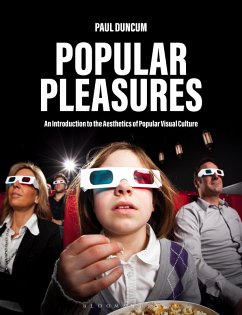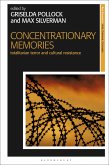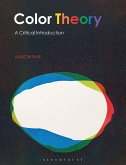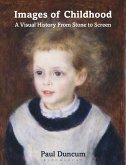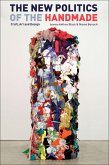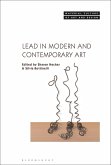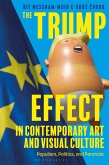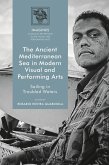Paul Duncum
Popular Pleasures (eBook, ePUB)
An Introduction to the Aesthetics of Popular Visual Culture
23,95 €
23,95 €
inkl. MwSt.
Sofort per Download lieferbar

12 °P sammeln
23,95 €
Als Download kaufen

23,95 €
inkl. MwSt.
Sofort per Download lieferbar

12 °P sammeln
Jetzt verschenken
Alle Infos zum eBook verschenken
23,95 €
inkl. MwSt.
Sofort per Download lieferbar
Alle Infos zum eBook verschenken

12 °P sammeln
Paul Duncum
Popular Pleasures (eBook, ePUB)
An Introduction to the Aesthetics of Popular Visual Culture
- Format: ePub
- Merkliste
- Auf die Merkliste
- Bewerten Bewerten
- Teilen
- Produkt teilen
- Produkterinnerung
- Produkterinnerung

Bitte loggen Sie sich zunächst in Ihr Kundenkonto ein oder registrieren Sie sich bei
bücher.de, um das eBook-Abo tolino select nutzen zu können.
Hier können Sie sich einloggen
Hier können Sie sich einloggen
Sie sind bereits eingeloggt. Klicken Sie auf 2. tolino select Abo, um fortzufahren.

Bitte loggen Sie sich zunächst in Ihr Kundenkonto ein oder registrieren Sie sich bei bücher.de, um das eBook-Abo tolino select nutzen zu können.
Today's many popular aesthetic pleasures have a very long history. Paul Duncum considers the historical critical discourses, and socio-political issues raised by aesthetic pleasures in fifteen thematic chapters. Using illustrative examples from the past, present, and across cultures, he challenges the idea of any decline of cultural standards and argues that no grounds exist for cultural pessimism. Refusing to condemn popular culture on the basis of taste, he reserves critique for the socio-political ideologies aesthetics invariably serve.
Art history, film, cultural studies, and…mehr
- Geräte: eReader
- mit Kopierschutz
- eBook Hilfe
- Größe: 10.34MB
Andere Kunden interessierten sich auch für
![Concentrationary Memories (eBook, ePUB) Concentrationary Memories (eBook, ePUB)]() Concentrationary Memories (eBook, ePUB)23,95 €
Concentrationary Memories (eBook, ePUB)23,95 €![Color Theory (eBook, ePUB) Color Theory (eBook, ePUB)]() Aaron FineColor Theory (eBook, ePUB)30,95 €
Aaron FineColor Theory (eBook, ePUB)30,95 €![Images of Childhood (eBook, ePUB) Images of Childhood (eBook, ePUB)]() Paul DuncumImages of Childhood (eBook, ePUB)21,95 €
Paul DuncumImages of Childhood (eBook, ePUB)21,95 €![The New Politics of the Handmade (eBook, ePUB) The New Politics of the Handmade (eBook, ePUB)]() The New Politics of the Handmade (eBook, ePUB)20,95 €
The New Politics of the Handmade (eBook, ePUB)20,95 €![Lead in Modern and Contemporary Art (eBook, ePUB) Lead in Modern and Contemporary Art (eBook, ePUB)]() Lead in Modern and Contemporary Art (eBook, ePUB)81,95 €
Lead in Modern and Contemporary Art (eBook, ePUB)81,95 €![The Trump Effect in Contemporary Art and Visual Culture (eBook, ePUB) The Trump Effect in Contemporary Art and Visual Culture (eBook, ePUB)]() Kit Messham-MuirThe Trump Effect in Contemporary Art and Visual Culture (eBook, ePUB)18,95 €
Kit Messham-MuirThe Trump Effect in Contemporary Art and Visual Culture (eBook, ePUB)18,95 €![The Ancient Mediterranean Sea in Modern Visual and Performing Arts (eBook, ePUB) The Ancient Mediterranean Sea in Modern Visual and Performing Arts (eBook, ePUB)]() The Ancient Mediterranean Sea in Modern Visual and Performing Arts (eBook, ePUB)27,95 €
The Ancient Mediterranean Sea in Modern Visual and Performing Arts (eBook, ePUB)27,95 €-
-
-
Today's many popular aesthetic pleasures have a very long history. Paul Duncum considers the historical critical discourses, and socio-political issues raised by aesthetic pleasures in fifteen thematic chapters. Using illustrative examples from the past, present, and across cultures, he challenges the idea of any decline of cultural standards and argues that no grounds exist for cultural pessimism. Refusing to condemn popular culture on the basis of taste, he reserves critique for the socio-political ideologies aesthetics invariably serve.
Art history, film, cultural studies, and philosophical aesthetics are each employed to show that the sensory/emotional lures of today's popular culture are mostly identical to those of premodern fine art. They include the violent, the horrific, the sentimental, the exotic, the erotic, and the humorous. Some of these pleasures derive from our evolutionary biology; they are all an important part of what it means to be human, and central to understanding contemporary society. Examples are wide-ranging, including British seaside postcards, Disney films, Nazi propaganda, burlesque, modern advertising, as well as many exemplars of fine art.
The book reveals fresh insights for all those studying visual culture, art history, aesthetics, media studies, and media and art education.
Art history, film, cultural studies, and philosophical aesthetics are each employed to show that the sensory/emotional lures of today's popular culture are mostly identical to those of premodern fine art. They include the violent, the horrific, the sentimental, the exotic, the erotic, and the humorous. Some of these pleasures derive from our evolutionary biology; they are all an important part of what it means to be human, and central to understanding contemporary society. Examples are wide-ranging, including British seaside postcards, Disney films, Nazi propaganda, burlesque, modern advertising, as well as many exemplars of fine art.
The book reveals fresh insights for all those studying visual culture, art history, aesthetics, media studies, and media and art education.
Produktdetails
- Produktdetails
- Verlag: Bloomsbury UK
- Seitenzahl: 240
- Erscheinungstermin: 26. August 2021
- Englisch
- ISBN-13: 9781350193420
- Artikelnr.: 61953334
- Verlag: Bloomsbury UK
- Seitenzahl: 240
- Erscheinungstermin: 26. August 2021
- Englisch
- ISBN-13: 9781350193420
- Artikelnr.: 61953334
Paul Duncum is Professor Emeritus at the University of Illinois, USA, and Adjunct Professor at the University of Tasmania, Australia.
List of Illustrations Introduction But What is Aesthetics? And What is
Popular? Popular Pleasures and Politics Previous Attempts So What's
Different Here? The Mind/Body Context Scope and Outline Chapter 1: A
Realistic Style What is Realism? Idolatry and Ideology The Search for
Realism Painting Screen Imagery The Pleasures of Realism Making Comparisons
Appreciating the Skill Evaluating Realism is Easy Pulling Back the Curtain
Realism and Reality When Too Much Realism is Bad When Seeing Shouldn't be
Believing Fake versus the Bona Fide Veridical, Virtual, and Verifiable
Chapter 2: The Illusionistic Illusion versus Realism Magic, Miracles and
the Devil The Persistence of Illusion Trompe-l'oeil Three-Dimensional
Movies Optical Illusion Devices Stage Magic Magic, Wonder and Mischief
Being Deceived Being in the Know Conflating Realism with Illusion Illusion
and Delusion Illusion and Life Chapter 3: The Bright and Busy Terms and
Taste The Doctrine of Decorum Reason and Restraint Modernist Minimalism The
Relativity of Restraint Serious versus Superficial Purpose Brightness and
Business Delighting the Eye Enhancing the Ordinary Resisting Restraint
Bright, Busy and Biology The Seriousness of Selling Bright, Busy and
Business Chapter 4: The Highly Emotional An Empire of Emotions Emotion
versus Emotionalism The Rhetoric of Emotions versus the Aesthetics of
Emotions The Theory of Emotional Rhetoric The Pictorial Practice of
Rhetoric The Rise of Sentiment Rejecting Rhetoric The Rise of Romanticism
Expression versus Imitation Fine Art and Popular Entertainment What Arouses
Emotion? Why Do Emotional Lures Work? Catharsis versus Cognitive Coping
Escaping Identifying Searching for Authenticity Seeking Attachment
Participating For Better or Worse Chapter 5: The Sentimental Surveying
Sentimentality A Discourse of Abuse A Sentimental Journey The Sugar of
Sentimentality The Comfort of an Aestheticized Sanctuary Longing for a Past
as Pleasant Love and Compassion as their Own Rewards The Ironic Distance of
Camp and Kitsch Social Progress Exercising Power The Sins of Sentimentality
Disempowering and Harming Sentimentality's Subjects Disempowering and
Infantilizing Viewers Poor Public Policy Sense and Sentimentality Chapter
6: The Vulgar Vulgarity and its Variants Vulgarity and Fine Art A
Historical Perspective Grotesques and Carnival Vulgar Porn Scatology
Vulgarity and Reform Viva Vulgarity! Disgust and Delight Transgression
Social Bonding Joyful Resistance Haunting and Humanness Vile Vulgarity
Transgression and Suppression Ridicule and Reaction Vexing Vulgarity
Chapter 7: The Violent Violence and is Variants A Violent Present A Violent
Past Explaining Violent Entertaiment Excitation Transfer Simultaneous
Emotional Pleasures Fear and Mastery Seeking Stimulus Everything But
Violence Algorithmic Allure The Problems of Violence Purgation Does Not
Work Diminishing Returns Mental Scripts of a Hostile World A Cycle of
Violence An End to Violence? Chapter 8: The Horrific Horror, Terror, and
Dread Sublime Terror versus Popular Horror Horror Hedonism Performative
Pleasures Escape and Stimulation Transfixed Fascination Making Moral
Judgments Wish Fulfillment and/or Recognition Transgressive Liberation
Repetition Horror and Humor Horror, Hostility and Hate Repression
Unleashing Hatred Uncanny Uncertainty Chapter 9: The Miraculous Miracles
and Marvels The Skeptical Discourse An Enchanted Universe of Miracles
Wonder Curiosity Creating Social Identity Finding Patterns and Purpose
Debunking Absurdities Parodying Absurdities Escaping into Fantasy Being
Confounded Spectacles of Wonder Miracles and Mirage Rejecting Rationality
Vulnerability and Vultures The Wonder of It All Chapter 10: The Exotic
Exoticism Explored The Exotic Discourse Exotic Enchantment Wonder Spice
Seasoning Cultural Renewal Defining Difference Feeling Culturally Superior
Taking Symbolic Possession Being Reassured Distortion, Disparagement and
Denigration Selectivity and Distortion Inferiority Complexes Superiority
Complexes Denial and Projection Exiting the Exotic Chapter 11: The Erotic
Exploring the Erotic Sexual Discourse The High Culture Alibi Enjoying the
Erotic Voyeurism Fetishism Sadism, Masochism and Sadomasochism
Identification Exhibitionism Queer and Queering Prohibition, Permission,
and Perfection Permissiveness and Perfection Pornification Selling Sex Sex,
Sin and Suppression Chapter 12: The Spectacular Sizing Up the Spectacular
The Spectacular versus Sensationalism Size Matters Wonder Thrills and
Spills Immersion Ego Loss Humor When Might Makes Right Requiring Submission
Failing to See/ Failing to Feel Ignoring the Unspectacular Tedium
Summarizing of the Spectacular Chapter 13: The Narrative The Nature of
Narrative The Modernist Rejection of Narrative Narrative Norms Narrative's
Gratifications Organizing Complexity Satisfying Curiosity Escaping into
Alternative Realities Emotional Identification Everything Else The Stories
We Tell The End Chapter 14: The Formulaic Recipes and Road Maps Formulaic
Fine Art Formulae and Form Why Formulae Work Easy Communication Reducing
Complexity Further Ongoing Comfort and Anxiety Innovation Reading Complexly
Formulae and their Challenges Boredom Formulae and Falsity Finishing with
Formulae Chapter 15: The Humorous Humor and Mirth Humor and the Haughty
Humor versus Gravitas Why We Smile, Snigger and Snort. Feeling Superior
Descending Incongruity Emotional Release Humor's Disciplinary and Dark Side
Anaesthesia of the Heart Imposing Social Discipline Ridicule and Repression
Humor and Hate Humor and Hostility References Index
Popular? Popular Pleasures and Politics Previous Attempts So What's
Different Here? The Mind/Body Context Scope and Outline Chapter 1: A
Realistic Style What is Realism? Idolatry and Ideology The Search for
Realism Painting Screen Imagery The Pleasures of Realism Making Comparisons
Appreciating the Skill Evaluating Realism is Easy Pulling Back the Curtain
Realism and Reality When Too Much Realism is Bad When Seeing Shouldn't be
Believing Fake versus the Bona Fide Veridical, Virtual, and Verifiable
Chapter 2: The Illusionistic Illusion versus Realism Magic, Miracles and
the Devil The Persistence of Illusion Trompe-l'oeil Three-Dimensional
Movies Optical Illusion Devices Stage Magic Magic, Wonder and Mischief
Being Deceived Being in the Know Conflating Realism with Illusion Illusion
and Delusion Illusion and Life Chapter 3: The Bright and Busy Terms and
Taste The Doctrine of Decorum Reason and Restraint Modernist Minimalism The
Relativity of Restraint Serious versus Superficial Purpose Brightness and
Business Delighting the Eye Enhancing the Ordinary Resisting Restraint
Bright, Busy and Biology The Seriousness of Selling Bright, Busy and
Business Chapter 4: The Highly Emotional An Empire of Emotions Emotion
versus Emotionalism The Rhetoric of Emotions versus the Aesthetics of
Emotions The Theory of Emotional Rhetoric The Pictorial Practice of
Rhetoric The Rise of Sentiment Rejecting Rhetoric The Rise of Romanticism
Expression versus Imitation Fine Art and Popular Entertainment What Arouses
Emotion? Why Do Emotional Lures Work? Catharsis versus Cognitive Coping
Escaping Identifying Searching for Authenticity Seeking Attachment
Participating For Better or Worse Chapter 5: The Sentimental Surveying
Sentimentality A Discourse of Abuse A Sentimental Journey The Sugar of
Sentimentality The Comfort of an Aestheticized Sanctuary Longing for a Past
as Pleasant Love and Compassion as their Own Rewards The Ironic Distance of
Camp and Kitsch Social Progress Exercising Power The Sins of Sentimentality
Disempowering and Harming Sentimentality's Subjects Disempowering and
Infantilizing Viewers Poor Public Policy Sense and Sentimentality Chapter
6: The Vulgar Vulgarity and its Variants Vulgarity and Fine Art A
Historical Perspective Grotesques and Carnival Vulgar Porn Scatology
Vulgarity and Reform Viva Vulgarity! Disgust and Delight Transgression
Social Bonding Joyful Resistance Haunting and Humanness Vile Vulgarity
Transgression and Suppression Ridicule and Reaction Vexing Vulgarity
Chapter 7: The Violent Violence and is Variants A Violent Present A Violent
Past Explaining Violent Entertaiment Excitation Transfer Simultaneous
Emotional Pleasures Fear and Mastery Seeking Stimulus Everything But
Violence Algorithmic Allure The Problems of Violence Purgation Does Not
Work Diminishing Returns Mental Scripts of a Hostile World A Cycle of
Violence An End to Violence? Chapter 8: The Horrific Horror, Terror, and
Dread Sublime Terror versus Popular Horror Horror Hedonism Performative
Pleasures Escape and Stimulation Transfixed Fascination Making Moral
Judgments Wish Fulfillment and/or Recognition Transgressive Liberation
Repetition Horror and Humor Horror, Hostility and Hate Repression
Unleashing Hatred Uncanny Uncertainty Chapter 9: The Miraculous Miracles
and Marvels The Skeptical Discourse An Enchanted Universe of Miracles
Wonder Curiosity Creating Social Identity Finding Patterns and Purpose
Debunking Absurdities Parodying Absurdities Escaping into Fantasy Being
Confounded Spectacles of Wonder Miracles and Mirage Rejecting Rationality
Vulnerability and Vultures The Wonder of It All Chapter 10: The Exotic
Exoticism Explored The Exotic Discourse Exotic Enchantment Wonder Spice
Seasoning Cultural Renewal Defining Difference Feeling Culturally Superior
Taking Symbolic Possession Being Reassured Distortion, Disparagement and
Denigration Selectivity and Distortion Inferiority Complexes Superiority
Complexes Denial and Projection Exiting the Exotic Chapter 11: The Erotic
Exploring the Erotic Sexual Discourse The High Culture Alibi Enjoying the
Erotic Voyeurism Fetishism Sadism, Masochism and Sadomasochism
Identification Exhibitionism Queer and Queering Prohibition, Permission,
and Perfection Permissiveness and Perfection Pornification Selling Sex Sex,
Sin and Suppression Chapter 12: The Spectacular Sizing Up the Spectacular
The Spectacular versus Sensationalism Size Matters Wonder Thrills and
Spills Immersion Ego Loss Humor When Might Makes Right Requiring Submission
Failing to See/ Failing to Feel Ignoring the Unspectacular Tedium
Summarizing of the Spectacular Chapter 13: The Narrative The Nature of
Narrative The Modernist Rejection of Narrative Narrative Norms Narrative's
Gratifications Organizing Complexity Satisfying Curiosity Escaping into
Alternative Realities Emotional Identification Everything Else The Stories
We Tell The End Chapter 14: The Formulaic Recipes and Road Maps Formulaic
Fine Art Formulae and Form Why Formulae Work Easy Communication Reducing
Complexity Further Ongoing Comfort and Anxiety Innovation Reading Complexly
Formulae and their Challenges Boredom Formulae and Falsity Finishing with
Formulae Chapter 15: The Humorous Humor and Mirth Humor and the Haughty
Humor versus Gravitas Why We Smile, Snigger and Snort. Feeling Superior
Descending Incongruity Emotional Release Humor's Disciplinary and Dark Side
Anaesthesia of the Heart Imposing Social Discipline Ridicule and Repression
Humor and Hate Humor and Hostility References Index
List of Illustrations Introduction But What is Aesthetics? And What is
Popular? Popular Pleasures and Politics Previous Attempts So What's
Different Here? The Mind/Body Context Scope and Outline Chapter 1: A
Realistic Style What is Realism? Idolatry and Ideology The Search for
Realism Painting Screen Imagery The Pleasures of Realism Making Comparisons
Appreciating the Skill Evaluating Realism is Easy Pulling Back the Curtain
Realism and Reality When Too Much Realism is Bad When Seeing Shouldn't be
Believing Fake versus the Bona Fide Veridical, Virtual, and Verifiable
Chapter 2: The Illusionistic Illusion versus Realism Magic, Miracles and
the Devil The Persistence of Illusion Trompe-l'oeil Three-Dimensional
Movies Optical Illusion Devices Stage Magic Magic, Wonder and Mischief
Being Deceived Being in the Know Conflating Realism with Illusion Illusion
and Delusion Illusion and Life Chapter 3: The Bright and Busy Terms and
Taste The Doctrine of Decorum Reason and Restraint Modernist Minimalism The
Relativity of Restraint Serious versus Superficial Purpose Brightness and
Business Delighting the Eye Enhancing the Ordinary Resisting Restraint
Bright, Busy and Biology The Seriousness of Selling Bright, Busy and
Business Chapter 4: The Highly Emotional An Empire of Emotions Emotion
versus Emotionalism The Rhetoric of Emotions versus the Aesthetics of
Emotions The Theory of Emotional Rhetoric The Pictorial Practice of
Rhetoric The Rise of Sentiment Rejecting Rhetoric The Rise of Romanticism
Expression versus Imitation Fine Art and Popular Entertainment What Arouses
Emotion? Why Do Emotional Lures Work? Catharsis versus Cognitive Coping
Escaping Identifying Searching for Authenticity Seeking Attachment
Participating For Better or Worse Chapter 5: The Sentimental Surveying
Sentimentality A Discourse of Abuse A Sentimental Journey The Sugar of
Sentimentality The Comfort of an Aestheticized Sanctuary Longing for a Past
as Pleasant Love and Compassion as their Own Rewards The Ironic Distance of
Camp and Kitsch Social Progress Exercising Power The Sins of Sentimentality
Disempowering and Harming Sentimentality's Subjects Disempowering and
Infantilizing Viewers Poor Public Policy Sense and Sentimentality Chapter
6: The Vulgar Vulgarity and its Variants Vulgarity and Fine Art A
Historical Perspective Grotesques and Carnival Vulgar Porn Scatology
Vulgarity and Reform Viva Vulgarity! Disgust and Delight Transgression
Social Bonding Joyful Resistance Haunting and Humanness Vile Vulgarity
Transgression and Suppression Ridicule and Reaction Vexing Vulgarity
Chapter 7: The Violent Violence and is Variants A Violent Present A Violent
Past Explaining Violent Entertaiment Excitation Transfer Simultaneous
Emotional Pleasures Fear and Mastery Seeking Stimulus Everything But
Violence Algorithmic Allure The Problems of Violence Purgation Does Not
Work Diminishing Returns Mental Scripts of a Hostile World A Cycle of
Violence An End to Violence? Chapter 8: The Horrific Horror, Terror, and
Dread Sublime Terror versus Popular Horror Horror Hedonism Performative
Pleasures Escape and Stimulation Transfixed Fascination Making Moral
Judgments Wish Fulfillment and/or Recognition Transgressive Liberation
Repetition Horror and Humor Horror, Hostility and Hate Repression
Unleashing Hatred Uncanny Uncertainty Chapter 9: The Miraculous Miracles
and Marvels The Skeptical Discourse An Enchanted Universe of Miracles
Wonder Curiosity Creating Social Identity Finding Patterns and Purpose
Debunking Absurdities Parodying Absurdities Escaping into Fantasy Being
Confounded Spectacles of Wonder Miracles and Mirage Rejecting Rationality
Vulnerability and Vultures The Wonder of It All Chapter 10: The Exotic
Exoticism Explored The Exotic Discourse Exotic Enchantment Wonder Spice
Seasoning Cultural Renewal Defining Difference Feeling Culturally Superior
Taking Symbolic Possession Being Reassured Distortion, Disparagement and
Denigration Selectivity and Distortion Inferiority Complexes Superiority
Complexes Denial and Projection Exiting the Exotic Chapter 11: The Erotic
Exploring the Erotic Sexual Discourse The High Culture Alibi Enjoying the
Erotic Voyeurism Fetishism Sadism, Masochism and Sadomasochism
Identification Exhibitionism Queer and Queering Prohibition, Permission,
and Perfection Permissiveness and Perfection Pornification Selling Sex Sex,
Sin and Suppression Chapter 12: The Spectacular Sizing Up the Spectacular
The Spectacular versus Sensationalism Size Matters Wonder Thrills and
Spills Immersion Ego Loss Humor When Might Makes Right Requiring Submission
Failing to See/ Failing to Feel Ignoring the Unspectacular Tedium
Summarizing of the Spectacular Chapter 13: The Narrative The Nature of
Narrative The Modernist Rejection of Narrative Narrative Norms Narrative's
Gratifications Organizing Complexity Satisfying Curiosity Escaping into
Alternative Realities Emotional Identification Everything Else The Stories
We Tell The End Chapter 14: The Formulaic Recipes and Road Maps Formulaic
Fine Art Formulae and Form Why Formulae Work Easy Communication Reducing
Complexity Further Ongoing Comfort and Anxiety Innovation Reading Complexly
Formulae and their Challenges Boredom Formulae and Falsity Finishing with
Formulae Chapter 15: The Humorous Humor and Mirth Humor and the Haughty
Humor versus Gravitas Why We Smile, Snigger and Snort. Feeling Superior
Descending Incongruity Emotional Release Humor's Disciplinary and Dark Side
Anaesthesia of the Heart Imposing Social Discipline Ridicule and Repression
Humor and Hate Humor and Hostility References Index
Popular? Popular Pleasures and Politics Previous Attempts So What's
Different Here? The Mind/Body Context Scope and Outline Chapter 1: A
Realistic Style What is Realism? Idolatry and Ideology The Search for
Realism Painting Screen Imagery The Pleasures of Realism Making Comparisons
Appreciating the Skill Evaluating Realism is Easy Pulling Back the Curtain
Realism and Reality When Too Much Realism is Bad When Seeing Shouldn't be
Believing Fake versus the Bona Fide Veridical, Virtual, and Verifiable
Chapter 2: The Illusionistic Illusion versus Realism Magic, Miracles and
the Devil The Persistence of Illusion Trompe-l'oeil Three-Dimensional
Movies Optical Illusion Devices Stage Magic Magic, Wonder and Mischief
Being Deceived Being in the Know Conflating Realism with Illusion Illusion
and Delusion Illusion and Life Chapter 3: The Bright and Busy Terms and
Taste The Doctrine of Decorum Reason and Restraint Modernist Minimalism The
Relativity of Restraint Serious versus Superficial Purpose Brightness and
Business Delighting the Eye Enhancing the Ordinary Resisting Restraint
Bright, Busy and Biology The Seriousness of Selling Bright, Busy and
Business Chapter 4: The Highly Emotional An Empire of Emotions Emotion
versus Emotionalism The Rhetoric of Emotions versus the Aesthetics of
Emotions The Theory of Emotional Rhetoric The Pictorial Practice of
Rhetoric The Rise of Sentiment Rejecting Rhetoric The Rise of Romanticism
Expression versus Imitation Fine Art and Popular Entertainment What Arouses
Emotion? Why Do Emotional Lures Work? Catharsis versus Cognitive Coping
Escaping Identifying Searching for Authenticity Seeking Attachment
Participating For Better or Worse Chapter 5: The Sentimental Surveying
Sentimentality A Discourse of Abuse A Sentimental Journey The Sugar of
Sentimentality The Comfort of an Aestheticized Sanctuary Longing for a Past
as Pleasant Love and Compassion as their Own Rewards The Ironic Distance of
Camp and Kitsch Social Progress Exercising Power The Sins of Sentimentality
Disempowering and Harming Sentimentality's Subjects Disempowering and
Infantilizing Viewers Poor Public Policy Sense and Sentimentality Chapter
6: The Vulgar Vulgarity and its Variants Vulgarity and Fine Art A
Historical Perspective Grotesques and Carnival Vulgar Porn Scatology
Vulgarity and Reform Viva Vulgarity! Disgust and Delight Transgression
Social Bonding Joyful Resistance Haunting and Humanness Vile Vulgarity
Transgression and Suppression Ridicule and Reaction Vexing Vulgarity
Chapter 7: The Violent Violence and is Variants A Violent Present A Violent
Past Explaining Violent Entertaiment Excitation Transfer Simultaneous
Emotional Pleasures Fear and Mastery Seeking Stimulus Everything But
Violence Algorithmic Allure The Problems of Violence Purgation Does Not
Work Diminishing Returns Mental Scripts of a Hostile World A Cycle of
Violence An End to Violence? Chapter 8: The Horrific Horror, Terror, and
Dread Sublime Terror versus Popular Horror Horror Hedonism Performative
Pleasures Escape and Stimulation Transfixed Fascination Making Moral
Judgments Wish Fulfillment and/or Recognition Transgressive Liberation
Repetition Horror and Humor Horror, Hostility and Hate Repression
Unleashing Hatred Uncanny Uncertainty Chapter 9: The Miraculous Miracles
and Marvels The Skeptical Discourse An Enchanted Universe of Miracles
Wonder Curiosity Creating Social Identity Finding Patterns and Purpose
Debunking Absurdities Parodying Absurdities Escaping into Fantasy Being
Confounded Spectacles of Wonder Miracles and Mirage Rejecting Rationality
Vulnerability and Vultures The Wonder of It All Chapter 10: The Exotic
Exoticism Explored The Exotic Discourse Exotic Enchantment Wonder Spice
Seasoning Cultural Renewal Defining Difference Feeling Culturally Superior
Taking Symbolic Possession Being Reassured Distortion, Disparagement and
Denigration Selectivity and Distortion Inferiority Complexes Superiority
Complexes Denial and Projection Exiting the Exotic Chapter 11: The Erotic
Exploring the Erotic Sexual Discourse The High Culture Alibi Enjoying the
Erotic Voyeurism Fetishism Sadism, Masochism and Sadomasochism
Identification Exhibitionism Queer and Queering Prohibition, Permission,
and Perfection Permissiveness and Perfection Pornification Selling Sex Sex,
Sin and Suppression Chapter 12: The Spectacular Sizing Up the Spectacular
The Spectacular versus Sensationalism Size Matters Wonder Thrills and
Spills Immersion Ego Loss Humor When Might Makes Right Requiring Submission
Failing to See/ Failing to Feel Ignoring the Unspectacular Tedium
Summarizing of the Spectacular Chapter 13: The Narrative The Nature of
Narrative The Modernist Rejection of Narrative Narrative Norms Narrative's
Gratifications Organizing Complexity Satisfying Curiosity Escaping into
Alternative Realities Emotional Identification Everything Else The Stories
We Tell The End Chapter 14: The Formulaic Recipes and Road Maps Formulaic
Fine Art Formulae and Form Why Formulae Work Easy Communication Reducing
Complexity Further Ongoing Comfort and Anxiety Innovation Reading Complexly
Formulae and their Challenges Boredom Formulae and Falsity Finishing with
Formulae Chapter 15: The Humorous Humor and Mirth Humor and the Haughty
Humor versus Gravitas Why We Smile, Snigger and Snort. Feeling Superior
Descending Incongruity Emotional Release Humor's Disciplinary and Dark Side
Anaesthesia of the Heart Imposing Social Discipline Ridicule and Repression
Humor and Hate Humor and Hostility References Index
